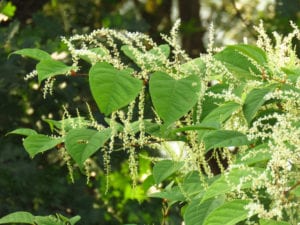Japanese knotweed which was first introduced into the UK from Japan in the 1850s as an ornamental garden plant is now the Environment Agency’s number one invasive plant species. Although a large proportion of the UK population are aware of the plant many are unaware of the legal ramifications they could face if the plant is on their property. This quick guide will hopefully make the position clearer and give you some info on what to do if it becomes a problem.
What Is Japanese Knotweed?
As mentioned above Japanese Knotweed was originally a garden plant, and although now classified as a weed, it is not unattractive and is edible both by humans and livestock animals. The problem with it is that it grows at an alarming rate, spreads easily by rhizome, and is very hard to destroy. This in itself wouldn’t be so much of a problem, but unfortunately, it is equally as good at damaging drains and property, seeming to have an uncanny knack for finding any weakness in a structure.

Japanese Knotweed Quite An Attractive Plant
Przemyslaw Muszynski/Shutterstock
This has led to its status on the Environmental Agency list and it has been classified as controlled waste under the Environmental Protection Act 1990. Thus it is an offence to deliberately spread it into the Environment. Thus disposal of any plant or any soil in which it has been present needs to be through a suitably qualified waste management service to avoid falling foul of this legislation.
The Legal Position, Selling A Property
Since 2013 if selling a property or any parcel of land there is a legal obligation to inform any prospective buyer if Knotweed is present. This is done via Form TA6 and the Law Societies guidance notes for question 7.8 reads as follows:
Question 7.8 – Japanese knotweed
The seller should state whether the property is affected by Japanese knotweed.
Japanese knotweed is a non-native invasive plant that can cause damage to property.
Japanese knotweed requires several years of treatment before it can be eradicated.
A Japanese knotweed management plan can help to control the spread of Japanese
knotweed and eradicate it.
Most management plans provide a record of works carried out to control Japanese
knotweed. They can provide reassurance to mortgage lenders who may be concerned about
the impact of Japanese knotweed on the value of the property.
Sellers should provide a copy of any Japanese knotweed management plan to the buyer.
Thus if you have the plant anywhere on your property it must be disclosed prior to the sale. Failure to do so (and ignorance is no defence) could lead to a compensation claim. Many lenders will not grant loans or mortgages where it is present, and self-treatment won’t cut it with them. Most will require a certificate of removal from a recognised expert contractor who can provide an insurance backed guarantee. Thus if you have some in your garden and plan to see the property at ant stage it might be wise to start an eradication programme early.
Keeping It Legally
It is not illegal to have the plant on your premises and to be fair it is quite an attractive plant, however as several recent legal rulings have shown, it is illegal to allow it to spread to neighbouring property. This is both a Criminal and a Civil offence. A Criminal offence could arise under amendments to the Anti-social Behaviour, Crime and Policing Act 2014 which could lead to a Criminal record & level 4 fine for an individual (currently up to £2,500) and up to £20,000 for a company.
A civil claim for damages could also arise under Nuisance as in Smith v Line and more recently Network Rail Infrastructure Ltd v Williams And Another (2018) where a claim was upheld by the Court of Appeal on the differing grounds of risk of damage and loss of amenity to adjoining property. In this case, although no damage had been caused, the proximity and or encroachment of the Knotweed to the claimant’s property was deemed as interference with the Claimants’ enjoyment of their property.
In layman’s terms failing to ensure that there is no risk of contamination to a third parties property could be enough to land you in court.
No doubt there will be a spate of further legislation but for now, if you have Japanese Knotweed on your property either seek specialist advice on having it removed r take steps to prevent any risk of it spreading.
If you are affected then speak to the person responsible and give them the chance to remedy the situation and if they don’t then give your Solicitor a call.
Want to speak to a solicitor?
If you would like to speak to one of our Panel Solicitors about Japanese Knotweed please complete the form below;